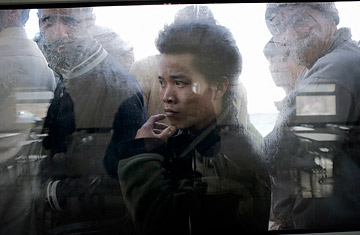
Foreign workers wait in queues in Benghazi, Libya, on Saturday, Feb. 26, hoping to evacuate the country
Aziz has no passport, no money and a lot of anxiety. He spent months making his way illegally northeast from West Africa, bypassing other conflicts, to get away from his own war-torn nation of Liberia and find something better in oil-rich Libya. "I was looking for survival," he says of the long desert journey from Sudan. For a year, he found it, earning a meager wage as a car washer in the town of Kish. Now, waiting in line at Shehada Jazeera School in the Libyan port city of Benghazi, he's running for his life all over again.
The Libyan revolution has just entered only its second week of turmoil. But tens of thousands of expatriates have already fled the country — spilling over the Egyptian and Tunisian borders, out of Tripoli on chartered evacuation flights and into the port at Benghazi, Libya's second largest city, which is now under rebel control.
In late February, foreign embassies scrambled to evacuate their nationals as fighting rocked the capital and other cities along the country's coast. On Feb. 25, a U.S.-chartered ferry evacuated more than 300 people, including 167 Americans, from Tripoli to Malta. British military aircraft evacuated 150 oil workers from the Libyan desert on Feb. 26, and the embassy chartered other aircraft from the capital. China says it has so far evacuated 12,000 Chinese workers out of some 33,000 believed to be working in the country.
On Saturday, Feb. 26, in Benghazi, a lone British diplomat scanned the lines of Chinese and Bangladeshi workers who were queuing in a cold Mediterranean drizzle, amid the overpowering stench of raw sewage, to board two Greek cruise ships that had docked overnight to evacuate more people. Sent by the British embassy in Tripoli, the diplomat said he was scouring the city for British citizens who still needed help. Finding none at the port, he got back into his car and drove off. Later, the ships departed, carrying only the Chinese workers; the hundreds of Bangladeshis who had waited for hours were left behind, many of them in tears.
Indeed, for those holding passports from the developing world, the situation is increasingly grim. Thousands of workers from South Asia and West Africa are stranded here, many without passports or any cash and with nowhere else to go. Crowding the floors of buildings inside the port are Indians, Pakistanis, Vietnamese, Thais and Filipinos. Most, like the Bangladeshis, have been abandoned by their construction companies. Their Turkish and Chinese managers have escaped without them, and their home countries are too poor, unorganized or anarchic to lend a hand. "We spoke to the Turkish consulate, and they said they would only take the Turkish people," says Idris Shebany, 42, a Libyan businessman turned volunteer who has set up camp at the port to help the foreign refugees, with a sigh. "The others have no ambassadors, no consuls," says another volunteer, Hayan Salaama, as he shakes his head.
In the absence of a functioning government or international aid organizations, it is Libyan volunteers like Shebany and Salaama — many of them businessmen and doctors in the opposition-held port city — who have taken on the difficult task of helping the foreign workers who have been left behind make their escape from chaos. They have set up a makeshift clinic and gathered blankets and mattresses, and they are churning out three meals a day for the foreign workers crowding abandoned offices and storage rooms. One man who normally sells women's clothes has picked up an AK-47 to guard the camp.
Shebany says that roughly 5,000 to 6,000 new foreigners have been arriving every day, many of them packed into buses or trucks. Most so far — Chinese, Turks, Americans and Europeans — have gotten out, the Chinese abandoning an entire battery of cars and trucks in their wake. A muddy field at one end of the port, where people making a quick exit had recently been camped, is scattered with shoes and discarded clothing.
On Saturday morning, 800 Filipinos and 400 Indians arrived from the desert towns of Jalu and al-Kufrah, Shebany says. But it's impossible to get an exact head count. "After an hour, it could be 2,000 to 3,000. We don't have a list, and at any minute, more buses could arrive." He tried asking the Egyptians if they could take any of the foreign nationals over the border. Their response was no.
